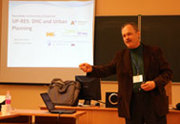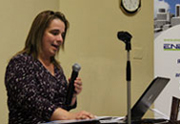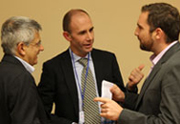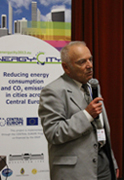

UP-RES
Training materials
In the UPRES project we have translated a set of training material on several European languages. The material is based on the experiences and materials used in the UPRES pilot training programs that were carried out in fall 2011-spring 2012. The set is designed to serve especially more extensive programs, but can be easily adapted to shorter programs as well as the structure is modularized. Each module consists of about 30 slides.
The training material is free to download, versions are available in PDF and PPT-format. In order to get the original PPT-files, please request for a username and password (request link can be found under the table). We would appreciate having your comments on the material, so please send your feedback to Anna-Maija Ahonen (anna-maija.ahonen[at]aalto.fi) and share your ideas how to improve it and experiences how you have utilized the material in your own training provision.
The training material below has been prepared in the UP-RES project under the Intelligent Energy Europe programme. The material will be available to you until March 2015, no updates will be provided. We apply creative commons license: the material free to use for non-commercial purposes. When using the material, please refer to the source. If you make modifications to the original material, please send a modified version to original authors.
NOTE! If you are using Internet Explorer as web browser, first save the PPT-file on your computer. Once the file is saved, you can open it.
Request a password to download Powerpoint and Excel files»
Project documents and presentations
UP-RES Final report: Making Cities Energy Efficient ![]()
Finnish pilot training project case publication (pdf, in Finnish only) ![]() ».
».
- UP-RES project presentation »
- Results of the training and competence needs analysis»
- Best practices
- Planning guidelines analysis and recommendations
Short course information
- General information on short courses »
- Summary and evaluation of short courses
- Introduction to short course training material set
- Short course training material set
- Towards development plans
Long course information
- Training contents in each country
- Plan for training delivery in each country
- Feedback and evaluation on long training courses
- Pilot tranining marketing material
Evaluation reports
- Project risk analysis report
- First evaluation report
- Second evaluation report
- Stakeholder analysis report
Energy-wise Urban Planner: Certification plans and outlines
Scientific articles
- David, Thomas; Haselmayr, Tom (2012) GIS-based analysis of renewable energy potentials in urban space. International Review of Applied Sciences and Engineering 3 (2012) 2, 127-132
- Rapp, Harald; Vautz, Sarah (2013). New challenges to professional training of urban planners and developers. EuroHeat&Power, English Edition, Vol. 10 1/2013 (February 2013), 30-34.
- Nuorkivi, Arto; Ahonen, Anna-Maija (2012) How can urban planning contribute to improved energy economy. Journal of Business and Economy. (November 2012 submitted to the expert panel)
- Nuorkivi, Arto; Ahonen, Anna-Maija; Mattila, Hanna; Heikkinen,
Timo (2012). Urban planners with energy skills.Journal on Science and Technological Studies. (November 2012 submitted to the expert panel) - Zöld, András, Szalay, Zsuzsa (2012) The nearly zero-energy requirements and the reference buildings. Building and Environment (Review in progress, submission to the editorial board)
International presentations
- UP-RES: DHC and Urban Planning (Aalto). 35th Euroheat&Power Congress 10.05.2011 in Paris, France
- 17th Building Services, Mechanical and Building Industry Days 14.10.2011 in Debrecen, Hungary
- Rehabilitation Strategy of District Heating (Aalto)
- Energy-Efficient Urban Development (AGFW)
- Low Temperature District Energy Systems (BRE)
- DHC from Renewable and Waste Energy in Barcelona (SaAS)
- GIS-based Mapping Tool of Urban Energy Demand for Room Heating and Hot Water (TUM)
- Solar Access and Energy Gain of the Buildings in a Densely Built Urban Area (UD)
- Integration of the Building Typology and the Decision Support System in the EnergyCity Project (UD)
- Sorption Isotherm Measurements Carried Out on Soil Samples (UD)
- Global Renewable Energy Trends and Hungary (UD)
- Annual Conference of Euroheat & Power and of the RHC Platform 26.04.2012 in Copenhagen, Denmark
- IACEE World Conference 17.-19.05.2012 in Valencia, Spain.CEE tackling Climate Change (Aalto)
- IFME 2012 - World Congress on Municipal Engineering 05.06.2012 in Helsinki, Finland. Urban Planners with Renewable Energy Skills - UP-RES (Aalto)
- AESOP Annual Congress
14.07.2012 in Ankara, Turkey. Urban Planners with Renewable Energy Skills (UP-RES)
(Aalto) - 25th regular Conference of district heating companies 18.-19.09.2012 in Balatonfüred, Hungary.Nearly zero – nearby and off-site (UD)
- DHC+ Technology Platform conference 09.-10.10.2012 in Brussels, Belgium (BRE)
- 18th Building Services, Mechanical and Building Industry Days -
Exhibition and International Conference
11.-12.10.2012 in Debrecen, Hungary
(Round table discussions and presentations at Debrecen conference 2011)
International workshops
- EcoHeat4Cities project meeting 29.11.2011 in Brussels, Belgium. Impacts of City Planning on Energy Consumption and GHG Emissions (Aalto)
- IEE Contractor's Workshop on RES H/C 24.04.2012 in Brussels, Belgium. Input from the UP-RES consortium (SaAS)
- Finpro Hungary 06.06.2012 in Helsinki, Finland. Urban Planning and District Heating Development (Aalto)
- Workshop at EUSEW 2012 19.06.2012 in Brussels, Belgium
- BehavE - Energy Efficiency & Behaviour 20.09.2012 in Helsinki, Finland. Enhanced Urban Planner Behaviour on RES and EE
- PATRES Workshop: Renewables, sustainability in urban planning and intelligent energy for European local authorities. The PATRES experience. 23.10.2012 in Brussels, Belgium.Experiences from UP-RES pilot courses (SaAS)
- WES2013 Forest Energy & Bioeconomy 11.02.2013
National presentations
- Finland
- Energia yhdyskuntasuunnittelussa (UP-RES) Energy in urban planning. Presentation at Energy Efficiency in Building Rehabilitation Seminar 25.09.2012 in Dipoli, Espoo, Finland
- Urban Planners with Renewable Energy Skills Second Aalto Event on Science and Technology Studies: Energy in Society, 05.11.2012
- Spain
- Catalan Cluster for Energy Efficiency: Working Group DHC 17.01.2011 in Barcelona. UP-RES project: Urban Planners with Renewable Energy Skills. (SaAS)
- Catalan Cluster for Energy Efficiency: Working group Training 22.02.2011 in Barcelona. UP-RES project: Urban Planners with Renewable Energy Skills. (SaAS)
- UP-RES Workshop at the Chamber of Architects 13.04.2011 in Barcelona. Energy supply of communities facing challenge of climate change (Aalto)
- UP-RES Workshop at the Chamber of Architects 13.04.2011 in Barcelona. Urban Planners with Renewable Energy Skills (UP-RES) (SaAS)
- Catalan Federation of Municipalities. Seminar on energy efficiency. 14.10.2011 in Barcelona. Energy evaluation of buildings. Energy and urban planning. (SaAS)
- Hungary
- United Kingdom
- Germany
- Kommunale Planung - Handlungsfelder für die post-fossile Stadt - Energieversorgung (AGFW) Municipal Planning - Fields of Action for the Post-Fossil City - Energy Supply. Presentation at Conference "Urbanität Stadt Öl" 05.10.2011 in Nürnberg, Germany
- Die energieeffiziente Stadt der Zukunft – Das Zusammenspiel
von Stadtplanung, Energieversorgung und Klimaschutz (AGFW)
The Energy-Efficient City of the Future - The Interaction between
Urban Planning, Energy Supply and Climate Protection
Presentation at VWA-Seminar "Programme der städtebaulichen Erneuerung
- aktuelle Entwicklungen und künftige Herausforderungen" 14.11.2011 in Dresden, Germany - Zukunft der energetischen Gebäudesanierung Future of Energy-Focused Building Refurbishment Expert presentation at SPD-closed conference 16.01.2012 in Berlin, Germany
- Die Rolle der Fernwärmeversorgung im Stadtentwicklungsprozess (AGFW) The Role of District Heating in the Urban Development Process Presentation at BDEW-Symposium "Chancen und Potenziale der Wärmeversorgung" 29.02.2012 in Leipzig, Germany
- Energieeffiziente Stadt der Zukunft - Stadtentwicklung, Energieversorgung
und Klimaschutz (AGFW)
Energy-Efficient City of the Future - Urban Development, Energy
Supply, Demographics and Climate Protection
Presentation at VWA-Seminar "Energetische Sanierung im Quartier" 23.04.2012 in Dresden, Germany - Energieeffiziente Stadt der Zukunft - Stadtentwicklung, effiziente Energieversorgung, Demografie und climaanpassung (AGFW) Energy-Efficient City of the Future - Urban Development, Efficient Energy Supply, Demographics and Climate Protection University lecture at HafenCity University Hamburg 10.05.2012 in Hamburg, Germany
- Energieeffiziente Stadtentwicklung in Ostdeutschland - mit KWK und Wärmenetzen die kommunalen Ziele erreichen (AGFW) Energy Efficient Urban Development in Eastern Germany - To Achieve Municipal Aims with Cogeneration Systems and Heat Grids Presentation at Euroforum Stadtwerketag Ostdeutschland 14.03.2012 in Berlin, Germany
Magazine articles
The articles below contain several pdf documents in the same file.
- International magazine articles
- Finnish magazine articles
- German magazine articles
- Hungarian magazine articles
- Articles to promote the pilot trainings
UP-RES Tools
Energy and greenhouse gas balance
Description Estimates a city’s energy balance and GHG emissions
Type Excel
Version 5
Last changed 2011-07-05
Download co2emission tool.xls »
This tool calculates a rough estimate of an energy and greenhouse gas emission balance for a given city from scarce data. Mandatory inputs are number of private households, number of employees in the tertiary sector and in industries. Information that is more detailed can be provided to increase precision of the estimate. As a fallback solution, additional data from national statistics is stored on a backup spreadsheet. It contains default values for all optional inputs. The greenhouse gas balance is calculated through emission factors, which assign a certain amount of emissions to each consumed energy unit.

Heat demand of residential buildings
Description Estimates a building’s energy demand for room heating
Type Excel
Version 4
Last changed 2011-09-07
Download heat demand of buildings.xls »
This tool can be used to assess the heat demand of a building by entering its surface area and climate zone. It allows for a quick comparison of the annual heat demand with building efficiency standards.

Heat map
Description Estimates a city’s heat demand
Type ESRI ArcGIS toolbox
Version 1
Last changed 2011-09-07
Download HeatmapTool.zip »
This toolbox for ArcGIS 10 and later implements a simple method to estimate heat demand of buildings from a database. The single needed input is a polygon layer of building shapes, together with an arbitrary building typology (“residential”, “office”, “industrial” …). It can be used to visualise areas of high heat demand, either for prioritizing districts for efficiency measures or for assessing viability of district heating.
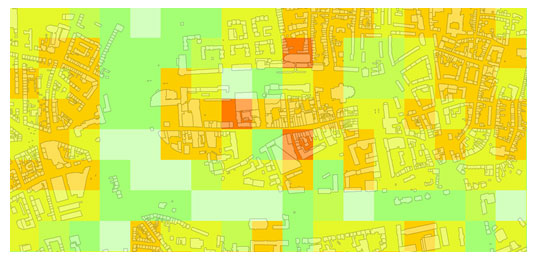
More information on tools from Johannes Dorfner, johannes.dorfner [a] tum.de and Arto Nuorkivi, energy[a]nuorkivi.fi
Tools used in the Finnish pilot training:
Introduction to the tools ![]()
M 02 Fuel and emissions ![]()
M 06 District Heating Econom ![]()
M 06 Heat pumps and CHP ![]()
 |
The sole responsibility for the content of this presentation lies with the authors. It does not necessarily reflect the opinion of the European Union. The European Commission is not responsible for any use that may be made of the information contained therein. |
![]()
Viimeksi päivitetty:
21.05.2013
. Sivusta vastaa: webmaster-aaltopro [a] aalto.fi
Aalto PROn päätoimipaikka: Dipoli-talo | PL 18 000, 00076 AALTO (Otakaari 24, 02150 Espoo).
